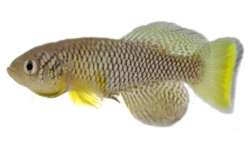April 5, 2017 report
Eating the gut contents of young fish lengthens life of older killifish

(Phys.org)—A team of researchers from several institutions in Germany has found that middle-age killifish fed the gut contents of younger killifish lived longer than normal. In their paper uploaded to the bioRxiv preprint server, the team describes their experiments with killifish, what they found and where they plan to take their research in the future.
Prior studies have shown that infusing the blood of a young animal into that of an older animal can offer both increased vitality and health benefits to the older animal. Other experiments have suggested that rejuvenating the gut biome of an animal might offer similar benefits. In this new effort, the team in Germany sought to find out if that might be true for the very short lived killifish.
Killifish are native to Zimbabwe and Mozambique, living in ponds that accumulate after a heavy rain. They reach maturity at just three weeks and generally die a few months later. Their short lifespan made them ideal subjects for experiments on possible lifespan extension due to gut biome rejuvenation.
The experiments by the researchers consisted of killing the gut biome in several middle-aged killifish (age 9.5 weeks) and then putting them in a tank filled with sterilized water. They then dumped the gut contents of young (6-week-old) killifish into the tank. The older fish did not actually eat the material but probed at it using their mouths to figure out if it was food. That was enough to allow the microbes to make their way into their guts. Six weeks later, the gut biome of the older fish was identical to the younger fish that had donated the gut material.
In studying the middle-age fish after the gut rejuvenation, the researchers found that they lived on average 37 percent longer than their peers who received no treatment. They also report that those fish with the rejuvenated biomes became more active, behaving like fish just six weeks old. Performing the reverse procedure, giving young fish a middle-aged biome, on the other hand, had no discernible impact.
The researchers acknowledge that they do not know how or why rejuvenation of the gut biome in the fish increased both vitality and lifespan, but suggest it might be tied to the immune system. They think it is possible that as fish grow older, their immune systems become less effective at warding off harmful or non-beneficial microbes in the gut. In that case, replacing the biome would mean removing the bad microbes, giving the gut a new start.
More information: Regulation of Life Span by the Gut Microbiota in The Short-Lived African Turquoise Killifish, bioRxiv, biorxiv.org/content/early/2017/03/27/120980
Abstract
Gut bacteria occupy the interface between the organism and the external environment, contributing to homeostasis and disease. Yet, the causal role of the gut microbiota during host aging is largely unexplored. Here, using the African turquoise killifish (Nothobranchius furzeri), a naturally short-lived vertebrate, we show that the gut microbiota plays a key role in modulating vertebrate life span. Recolonizing the gut of middle-age individuals with bacteria from young donors resulted in life span extension and delayed behavioral decline. This intervention prevented the decrease in microbial diversity associated with host aging and maintained a young-like gut bacterial community, characterized by overrepresentation of the key genera Exiguobacterium, Planococcus, Propionigenium and Psychrobacter. Our findings demonstrate that the natural microbial gut community of young individuals can causally induce long-lasting beneficial systemic effects that lead to life span extension in a vertebrate model.
© 2017 Phys.org


















